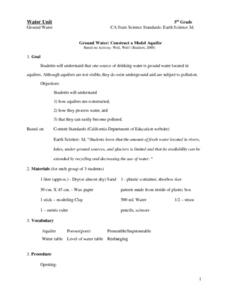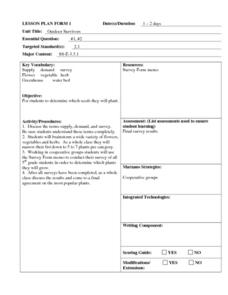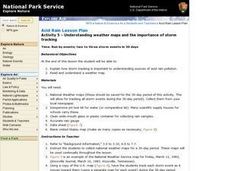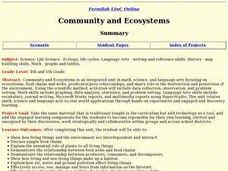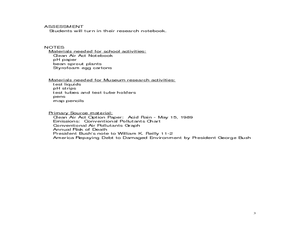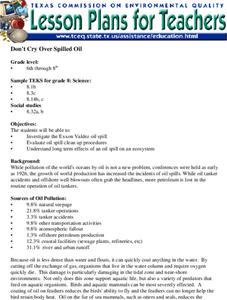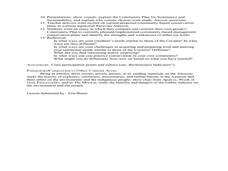Curated OER
Recycling
Fourth graders gain an awareness of recycling. In this science lesson plan, 4th graders become aware of how much garbage we can produce, identify landfills and their purposes, and explain how recycling saves energy and resources while...
Curated OER
Ground Water: Construct a Model Aquifer
Students recognize that one source of drinking water is ground water located in aquifers. They create a model of an aquifer and summarize their experience in a report.
Curated OER
It's a Small World After All! (Pond Microcosms)
Young scholars use microscopes to investigate the diversity of life that exists in pond water. They then conduct a controlled investigation to study the effect of a pollutant (rice) on a microcosm ecosystem.
Curated OER
Out of the Deep
Learners observe, describe, and record characteristics of ocean animals (mammals and fish) and sea shells. They conduct an experiment comparing and contrasting sugar water, salt water and fresh water and create a mural of coral reef...
Curated OER
Outdoor Survivors
Fifth graders complete a survey to decide what are most popular plants among the class. They test the water quality in a nearby pond. Studnts test the quality of soil samples taken from their homes. Different plants are moistened with...
Curated OER
Erosion
Fifth graders study what erosion is, what causes it, and ways to slow its progress. They complete an experiment that depicts soil moving down a slope as water is poured on it to show how moving water erodes land. Next, they observe...
Curated OER
Earth Day
Students participate in activities to make them aware of Earth Day and its significance, and how they can make a difference in saving the environment.
Curated OER
Living and Non-Living
Students discover the basic needs of life. In this science lesson plan, students explore how all living things need air, water, food and shelter
Curated OER
Lesson Six
Students investigate the importance of ocean resources and what humans need to do to maintain a healthy ocean. For this oceans lesson students participate in an activity after viewing a PowerPoint presentation on the Earth's Waters.
Curated OER
Understanding Weather Maps and the Importance of StormT
Young scholars explain how storm tracking is important to understanding sources of acid rain pollution. The read and explain a weather map. They set up plastic or glass collection container for rain in an open area away from buildings...
Curated OER
Rainbow Milk
Students complete activities to learn about rainbows and the importance of dairy in their diet. In this sense and diet lesson, students discuss rainbow colors, the importance of sight, and the importance of dairy in a healthy diet....
Curated OER
White-tailed Deer Issues
Ninth graders examine the white tail deer population in Pennsylvania and explore the impacts that the deer have on the flora and fauna. For this white-tail deer lesson students complete an activity and graph their results.
Curated OER
Community and Ecosystems
Students complete a unit of lessons on ecosystems. They participate in online activities, create a diorama, write journal entries, and develop a Hyperstudio multimedia project on a selected ecosystem.
Michigan Sea Grant
Fish Habitat and Humans
Strict habitat requirements are needed for the survival of fish populations and fish variety in the Great Lakes. Young scientists become experts in the basic needs of fish and understand how survival necessities can vary with different...
Curated OER
Martha Who?
Students explore how the number and types of organisms an ecosystem can support depends on the resources available and on abiotic factors, such as quantities of light and water, a range of temperatures, soil composition. They are...
Curated OER
Cool It! Comprehension: Chart 4
In these reading comprehension worksheets, students read chart 4 about fixing global warming and then complete several activities that help them understand the things that can be done to reduce the amount of energy wasted.
Curated OER
CLEAN AIR ACT (1990)
Students investigate the effects of acid rain by conducting an experiment with bean sprouts and graph the results. In this Environmental Policy lesson, students visit a museum to identify examples of foreign and domestic policy on...
Curated OER
A Healthy Environment
Students market healthy environments. In this healthy environment lesson plan, students participate in an activity that requires them to examine the food web. Students then research healthy and unhealthy environments and use their...
Curated OER
Earth Day - Reduce - Reuse - Recycle
In this Earth Day worksheet, students fill in the blanks to sentences, match words to definitions, and make slogans for pictures about reducing, reusing, and recycling. Students complete 3 activities.
Curated OER
Don't Cry Over Spilled Oil
Pupils study the Exxon Valdez Oil Spill while evaluating oil spill clean up activities. They discover the long term impact can have on an ecosystem by completing this experiment.
Curated OER
Observation Journal
In this ocean life learning exercise, students observe the plants, animals, human activity, park rules/local laws, at a specific location. Students also observe any activity in neighborhoods, the water sources for the area, the water...
Curated OER
Build Your Own Weather Station
Studens experiment with temperatures. In this science lesson, pupils make their own weather station by heating one bottle and keeping the water in another bottle at room temperature.
Curated OER
Shells
Students participate in an activity that reinforces their skills with subtracting of two-digit numbers. They read in their Math Storybook's about seashells on the beach, hermit crab's and discuss how many they see and where did all the...
Curated OER
Supermarkets, Sustenance and Sustainability
Students investigate jungles and the people who depend upon them. In this sustainability lesson, students research wild life conservation and discover the importance of a jungle to Amazonian people. Students create a group presentation...



